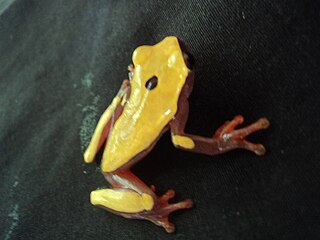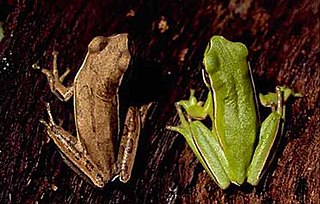Dendropsophus berthalutzae is a species of frog in the family Hylidae. It is endemic to southeastern Brazil and occurs in the coastal lowlands and the Serra do Mar in Espírito Santo, Minas Gerais, Rio de Janeiro, São Paulo, and eastern Paraná states. It is named in honor of Bertha Lutz, a Brazilian zoologist and feminist. Common name Bertha's treefrog has been coined for it.

Dendropsophus bifurcus, commonly known as the Upper Amazon treefrog, is a species of frog in the family Hylidae. It is found in the upper Amazon Basin of Bolivia, Brazil, Colombia, Ecuador, and Peru. Dendropsophus bifurcus is an abundant and widespread species that inhabits bushes in open forest and clearings. It breeds in permanent and temporary shallow ponds. Eggs are laid out of the water on leaves whereas the tadpoles develop in the water.

Dendropsophus carnifex, the executioner tree frog, executioner clown frog or hangman swamp frog, is a species of frog in the family Hylidae.

Dendropsophus columbianus is a species of frog in the family Hylidae. It is endemic to the Andes of Colombia. Dendropsophus columbianus is a common and adaptable species that lives in disturbed areas that formerly supported cloud forests; it has not been found in closed forests. It is typically associated with open habitats, especially those with some waterbodies.

Dendropsophus decipiens is a species of frog in the family Hylidae. It is endemic to eastern Brazil between the Pernambuco and Rio de Janeiro states, or following IUCN, between the Maranhão and São Paulo states. It is also known as Brazilian coastal treefrog.
Dendropsophus gaucheri is a species of frogs in the family Hylidae.

Dendropsophus leucophyllatus is a species of frog in the family Hylidae. It is found in the Amazon Basin . This widespread and locally common species is found near water in a wide variety of tropical habitats. There are no known significant threats to this species.

Dendropsophus microcephalus is a species of frog in the family Hylidae. It is found in southeastern Mexico, Central America, and northern South America in Colombia, Venezuela, Trinidad and Tobago, the Guianas, and northern Brazil. This widespread species might actually be a species complex. Its common names include yellow treefrog, small-headed treefrog, and yellow cricket treefrog.

Dendropsophus minutus is a species of frog in the family Hylidae. It is found in Argentina, Bolivia, Brazil, Colombia, Ecuador, French Guiana, Guyana, Paraguay, Peru, Suriname, Trinidad and Tobago, Uruguay, and Venezuela. In Spanish it is known as ranita amarilla común.

Dendropsophus nanus is a species of frog in the family Hylidae.

Dendropsophus parviceps is a species of frog in the family Hylidae. It is found in the Amazon Basin of Bolivia, Brazil, Colombia, Ecuador, Peru, and Venezuela. Dendropsophus parviceps is a locally common species with no known threats. These frogs are found on the leaves and branches in primary and secondary tropical rainforest, but also in open spaces close to forests. It is found in moist habitats. It breeds in temporary bodies of water. Eggs are laid in water where the tadpoles develop.

Dendropsophus phlebodes, the San Carlos treefrog or San Carlos dwarf treefrog, is a species of frog in the family Hylidae. It is found in western Colombia, Costa Rica, Nicaragua and Panama. Its natural habitats are tropical moist lowland forests, but it may also occur in disturbed habitats. It is threatened by habitat loss.

Dendropsophus rhodopeplus is a species of frog in the family Hylidae. It is found in the upper Amazon Basin in Bolivia, Brazil, Colombia, Ecuador, and Peru.

Dendropsophus robertmertensi is a species of frog in the family Hylidae. It is found in the Pacific lowlands of El Salvador, Guatemala, and southeastern Mexico. A separate population exists in the Cintalapa Valley in Chiapas.

Dendropsophus rubicundulus is a species of frog in the family Hylidae. It is found in Bolivia and Brazil. Earlier records from Paraguay are probably based on misidentified Dendropsophus jimi and Dendropsophus elianeae, but it is still likely to be also found in that country.

Dendropsophus sarayacuensis is a species of frog in the family Hylidae.
Dendropsophus sartori is a species of frog in the family Hylidae. It is endemic to Mexico and occurs on the Pacific slopes of southwestern Mexico in Jalisco, Guerrero, and Oaxaca. Its natural habitats are lowland dry tropical forests. It breeds during the rainy season when it is commonly found in temporary ponds. It is a common species but its habitat is being lost.
Dendropsophus stingi is a species of frogs in the family Hylidae. It is endemic to Colombia and occurs on the eastern slope of the Cordillera Oriental in the Boyacá Department. The species was named after celebrity musician Sting in recognition of his "commitment and efforts to save the rain forest". Despite this, common name Kaplan's Garagoa treefrog has been coined for it.

Dendropsophus triangulum is a species of frog in the family Hylidae. It is found in the upper Amazon Basin in Bolivia, western Brazil, Colombia, Ecuador, and Peru.

The Montevideo tree frog is a species of frog in the family Hylidae found in eastern, central, and northern Argentina, south-eastern Brazil, south-eastern Paraguay, and Uruguay. It is a common species occurring in open habitats in forests, grasslands, and flooded savannas. Breeding takes place in permanent ponds and flooded grasslands.


















